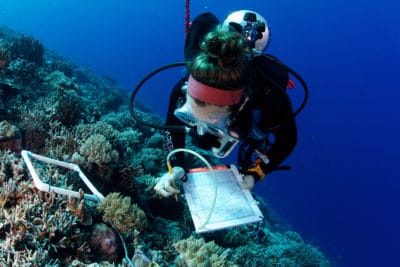Science
 For nearly twenty years, the Khaled bin Sultan Living Oceans Foundation has been conducting cutting-edge coral reef research in remote locations around the world. Wherever we work, our core marine science team partners with local scientists who are familiar with the marine community and understand the major threats coral reefs face in their waters. To date, our collaborative approach to scientific research has focused on:
For nearly twenty years, the Khaled bin Sultan Living Oceans Foundation has been conducting cutting-edge coral reef research in remote locations around the world. Wherever we work, our core marine science team partners with local scientists who are familiar with the marine community and understand the major threats coral reefs face in their waters. To date, our collaborative approach to scientific research has focused on:
- Scientific Surveys: Characterizing the community structure and functional role of reef fishes, stony corals, algae and other ecologically and economically important organisms in marine ecosystems.
- Habitat Mapping: Mapping the spatial distribution of marine habitats in poorly studied, remote coral reef ecosystems.
- Coral Ecology: Studying the relationships between coral reef organisms and their interactions with the natural and human environment.
- Reef Resilience: Assessing the current status and major threats to coral reefs and studying factors that can enhance their capacity to survive in a rapidly changing environment.
All of our scientific findings and GIS maps are published and shared freely with participating countries and scientific and regulatory organizations so that they can be used to develop sound environmental management strategies for coral reefs.
Global Reef Expedition
Our marine science team conducted the world’s largest coral reef research survey: the Global Reef Expedition, a research mission that nearly circumnavigated the globe aboard the M/Y Golden Shadow to study the health and resiliency of coral reefs. This once-in-a-lifetime research opportunity brought together nearly 200 coral reef researchers from around the world, in collaboration with local partners, to conduct management-driven coral reef research under the Foundation’s Science Without Borders® program. Over the course of five years, the Global Reef Expedition conducted 22 month-long research missions, studying over 1,000 coral reefs in 15 countries in the Atlantic, Pacific, and Indian Oceans. The primary scientific goals of the Expedition are to map and characterize coral reef ecosystems, assess their current status and major threats, and examine factors that enhance their ability to resist, survive and recover from major disturbance events. Now that the field research for the Global Reef Expedition is complete, we are focused on publishing our findings and sharing our results with participating countries so they can make informed decisions on how to use their marine environment.
